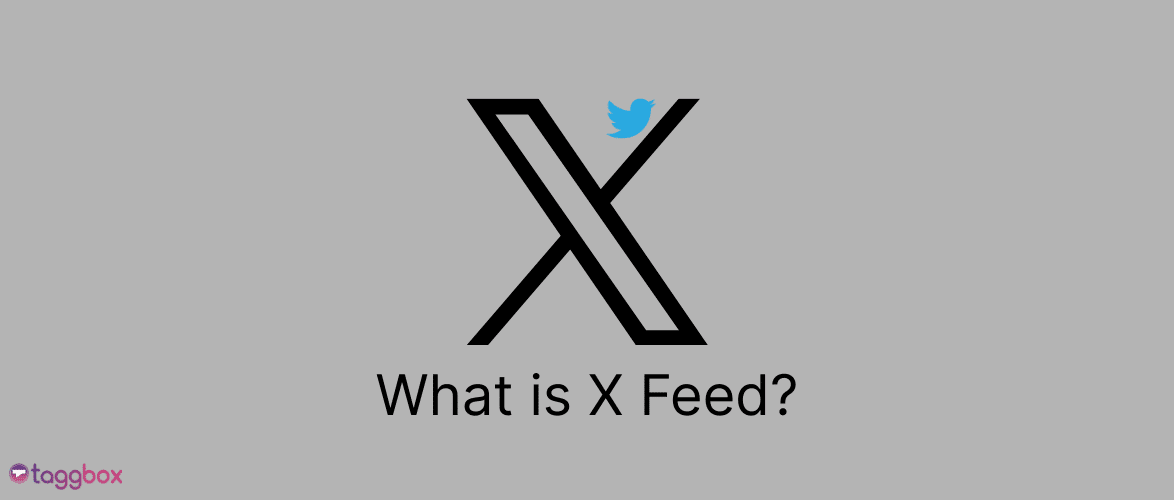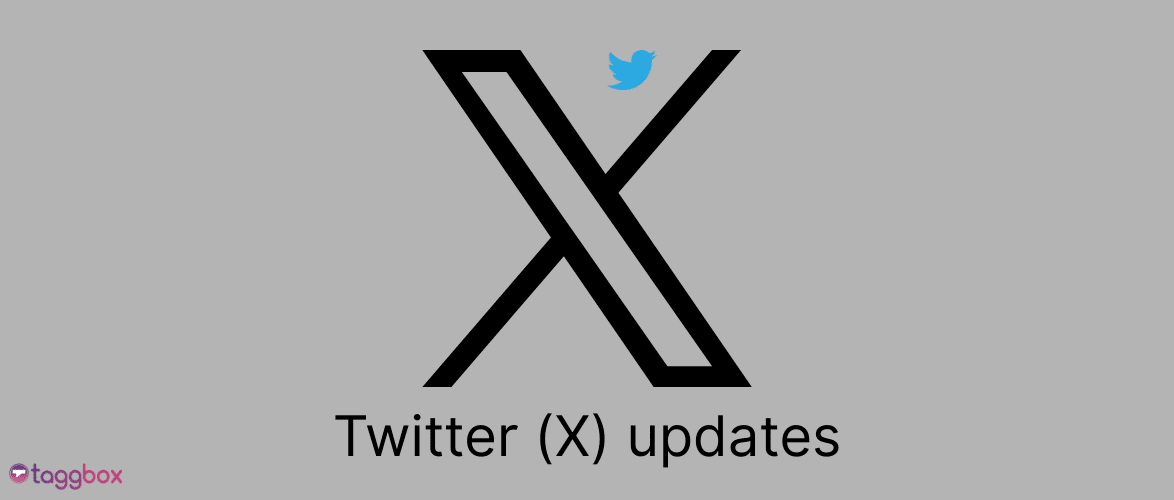Read summarized version with
Shoppers don’t just buy because you tell them to. They look for signals, reviews, conversations, and what real people are saying online.
In fact, almost half of buyers trust reviews like they’d trust a friend’s advice.
That’s where X feed can perform as a great review platform for your brand. It’s not just random tweets, it’s unfiltered voices talking about your brand in real time.
For brands, embedding it on a website means instant freshness, real voices, and credibility you can’t fake. If you’re serious about conversions, ignoring X feeds isn’t an option.
Read on to this article as we discuss the importance of embedding X feed on the brand website in 2025.
Display X Feed on Your Website
| No Credit Card Required |
What is X Feed?
X Feed is the live stream of posts you see on X (formerly Twitter). It shows updates from people you follow, along with your own posts, all in one place.
X feed keeps changing every second. You can scroll, like, comment, or repost directly from there.
In simple words, X Feed is your real-time timeline where all activity appears as it happens.
But what does adding feed to your brand website mean?
Adding a (X) feed to your brand website means showing live posts and conversations from X directly on your site. It’s bringing real-time customer voices, updates, and buzz about your brand into one place, making your website feel fresher, authentic, and connected.
Now comes the bigger question –
Why Add X Feeds to a Website: Key Benefits
Adding an X feed to your website is not just decoration. It’s a growth lever if you use it smartly.
1. SEO push
Search engines prefer active websites. A live X feed drops fresh content on your site without you lifting a finger. That movement tells Google, “this site is active,” and that alone can give your rankings a bump.
2. Real proof, not claims
People trust people. When visitors see genuine mentions, shoutouts, and replies on your X feed, it hits harder than any polished copy. It’s real voices backing your brand. That’s credibility you can’t fake.
3. More followers, more reach
An integrated X feed is basically a silent pitch: “hey, follow us too.” A percentage will. That compounds over time.
4. Direct conversions
Make your Twitter widget shoppable, tag products, and link offers. That turns casual browsers into buyers, right where they’re scrolling.
Types of Twitter/X Feeds To Add On a Website
Not every X feed works the same. The type you choose depends on what you want from your audience: awareness, Twitter engagement, or direct conversions. Here are the most useful ones:
1. Hashtag Feed
On X, hashtags kinda run the whole thing. People tag almost anything: news, trips, or random events. Dropping a live hashtag feed on your site shows what everyone’s talking about right this minute. It looks fresh, feels real, and yeah, people end up staying around more than they would on some plain static page.
2. Profile/Handle Timeline Feed
This one’s simple. It streams posts directly from your handle. Perfect if you’re active on X and want your website to reflect that energy. Visitors see your latest updates without leaving the page.
3. List Feed
Lists let you curate voices that matter in your niche. Think of it as your brand’s recommended reading list. Embedding it on your site shows you’re plugged into the right communities, not just shouting into the void.
4. Mention Timeline Feed
Here’s the gold mine, user-generated content. A mention feed displays what others are saying about you. Social proof, raw and unfiltered. It builds trust faster than any marketing line you write yourself.
5. Favorites Feed
Sometimes you don’t want to show everything. Favorites feed is like a handpicked gallery of posts you’ve saved. Great for highlighting thought leadership, partners, or posts that align with your brand values.
6. Sidebar Feed
Got limited space? Stick your X feed in the sidebar. It’s subtle, doesn’t clutter the page, but still keeps visitors engaged with live content.
7. Slideshow Feed
Visual, dynamic, eye-catching. A slideshow feed rotates tweets with smooth transitions. Works well for events, campaigns, or anywhere you need motion to grab attention.
How To Display X Feed on a Website 2025
Embedding a Twitter feed on your site is way easier than most people think. You don’t need coding skills, just a x aggregator tool like Taggbox. Here’s how it works:
Step 1 – Create your feed
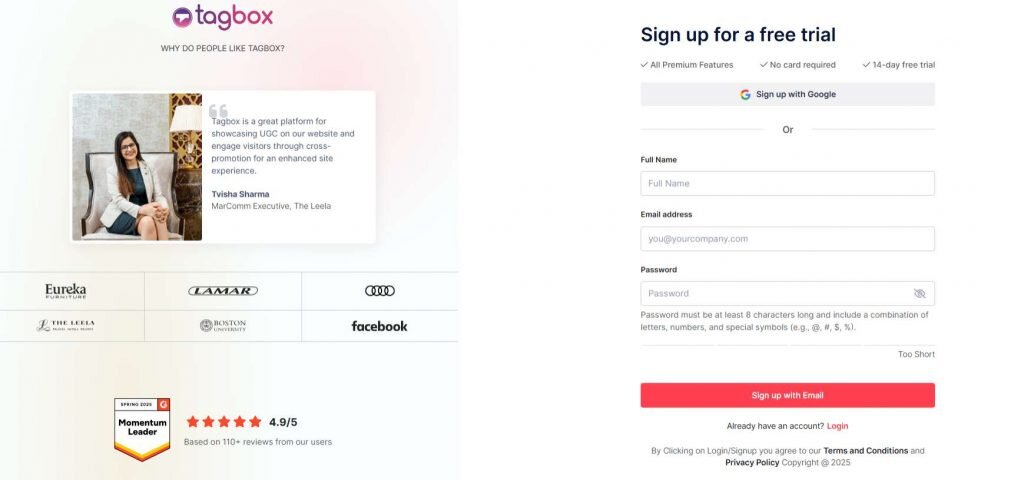
- Head to Taggbox.com, sign up (free) or log in. From the options, pick “Social feeds on website.”
- Then choose your industry, drop your phone number, and hit submit.
- In the content sources, select “Twitter” (still shows up as Twitter, not X).
- Next, decide the type: Hashtag, Handle, Mentions, or Advanced.
- Hit Create Feed and you’ll see your live feed in seconds.
Step 2 – Clean it up

Not every post deserves a spot on your website. Use the moderation panel to remove irrelevant or off-brand tweets. That’s how you keep the feed sharp and useful.
Step 3 – Customize the look
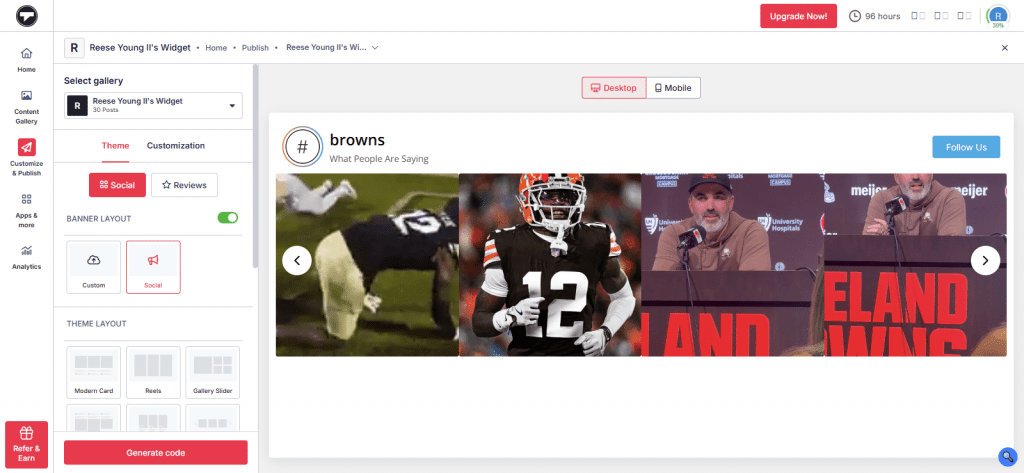
Pick a theme, change fonts, colors, layouts, and make the X feed match your site’s design instead of sticking out like a patch.
Step 4 – Embed the code
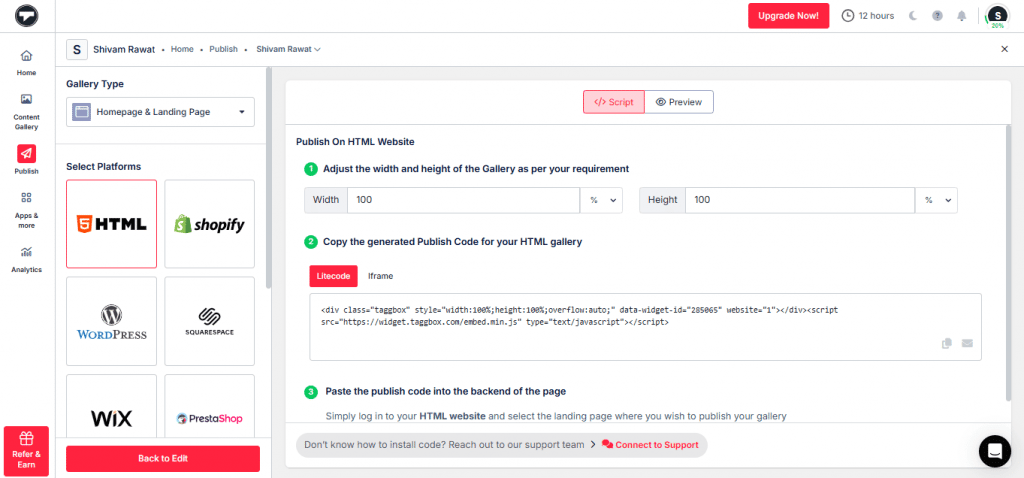
Click publish, select “Website,” then generate the embed code. Copy-paste it into your site’s backend. Done.
Also, Taggbox lets you make the feed shoppable. That means a visitor sees a post, clicks, and buys, no long funnel, no extra steps.
Add X Feed To The Website
Integrate Display twitter posts on website without any Hassle.
Best Places to Display an X Feed on Your Website
Where you place an X feed matters more than people think. Stick it in the wrong spot and visitors won’t even notice. Put it smartly, and it becomes a hook that keeps people scrolling.
Here are the best spots to consider for your X feed:
– Homepage
Your homepage is prime real estate. Dropping an X feed here gives visitors a live snapshot of your brand activity the second they land. It’s dynamic, not another static block of text.
– Footer
If you want subtle, the footer works. It doesn’t scream for attention, but it quietly shows your brand is active. Just know, it won’t pull the same engagement as a top placement.
– Sidebar
Perfect for blogs or news-heavy sites. A sidebar feed sits neatly next to your content, updating in real time without distracting from the main article.
– Dedicated Page
Want to go all in? Create a separate page just for your feed. Use it to highlight testimonials, campaigns, or curated conversations around your brand.
Quick Tips for Displaying an X Feed
- Use aggregators like Taggbox for easy styling and moderation.
- Native embed from publish.twitter.com works too, but customization is pretty limited.
- Pick the spot based on your goal, visibility, trust, or conversion.
X Feed vs. Static Testimonials: Which Works Better?
Wondering how embedding an X feed is better than a static testimonial wall? Let’s discuss –
| Feature / Factor | X Feed (Live) | Static Testimonials | What It Means for You |
| Freshness | Always updating in real-time | Stays the same until manually updated | X feed keeps your site looking alive, but testimonials can feel outdated. |
| Trust Factor | Raw, authentic voices from real users | Polished, curated quotes | Live X feed feels authentic, but testimonials can look staged. |
| SEO Value | Constant new content helps search rankings | Minimal SEO impact | X feed boosts relevance; testimonials don’t move the needle much. |
| Conversion Impact | Can link posts, make it shoppable | Good for credibility, but static | X feed drives action, testimonials reassure, but don’t convert alone. |
Parting Words: How X Feeds Build Social Proof for E-commerce Brands!
In e-commerce, trust sells more than discounts. An X feed does that by putting real voices, customers, influencers, and everyday buyers, right next to your products. It’s not just showing off tweets, it’s showing proof. When people see others using or recommending what you sell, it lowers doubt and pushes them closer to buying. And if you make the feed shoppable, that trust instantly turns into clicks and conversions.
Bottom line, social proof isn’t optional anymore; it’s the shortcut to faster sales. Tools like Taggbox make it dead simple to embed and customize an X feed that works for your brand.
Try Taggbox, and let your customers do the selling for you.

